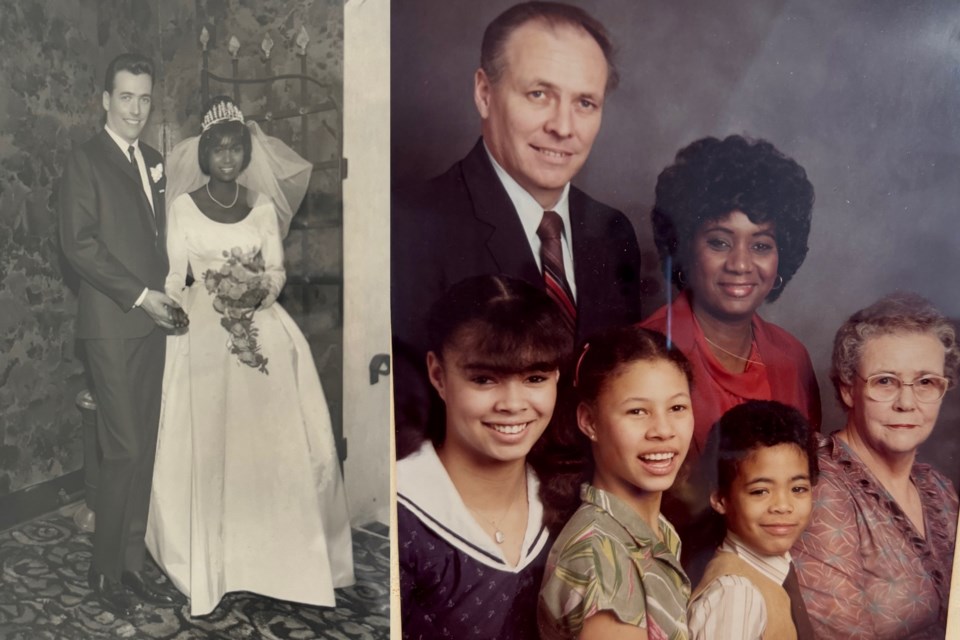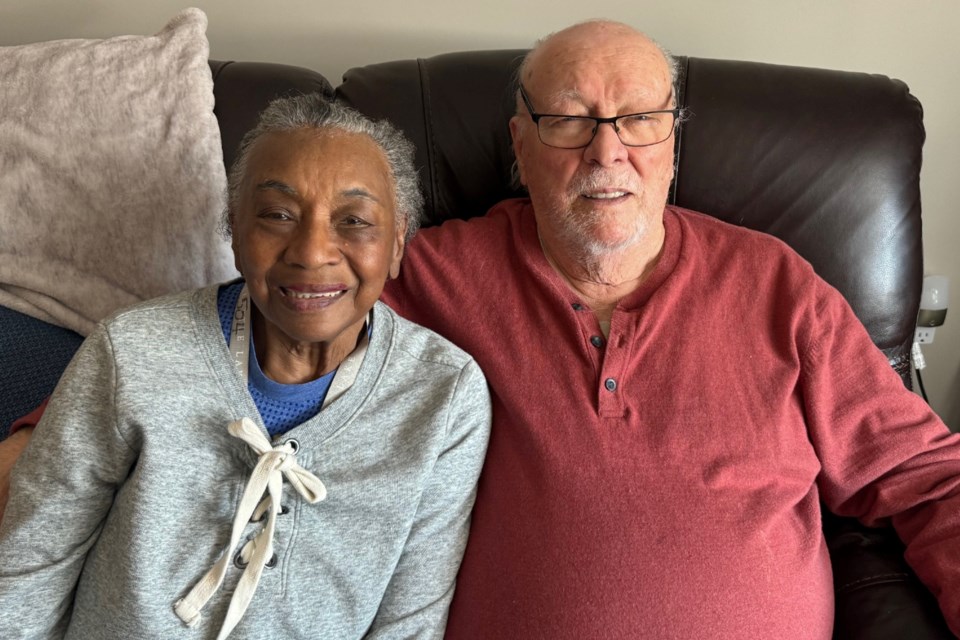Bill and Pat Helland are proof that love can overcome pretty much anything if you’re willing to put in the work.
The Barrie couple, who live at the Amica Little Lake retirement residence in the city’s north end, met in the early 1960s while working in the same building in downtown Toronto.
Bill was an RCMP officer, born and raised in Saskatchewan, and Pat, who hailed from Trinidad and Tobago, was working in Veterans Affairs. They met in the building’s coffee shop.
“I went down for my coffee break. I was very good friends with the cashier, and she said to me there was this guy ‘who is dying to meet you,’” Pat, 82, recalled. “I said, ‘Well, where is he?’”
When she returned later that afternoon, Pat decided to take it upon herself to search out the mystery man.
“She said he was over there. I took matters into my own hands. I didn’t wait for him to come to me. I went to him,” she said. “Everybody in the room stood still, because I was the only Black person in the entire building.”
Although the couple had no issue with the different colours of their skin, not everyone around them was as accepting, they acknowledged. Being an interracial couple during that time in history posed some challenges, the couple said.
“Detroit was burning. It was right during the Martin Luther King Jr. era and things were upside down,” said Bill, now 84. “People wanted change, but they didn’t know what to do. Nowadays, we define things with politics and religion. In those days, it was a jungle out there. Nobody knew what was coming next.”
Bill vividly recalls visiting an aunt who lived in Windsor, just across the river from Detroit, and looking across to see the Motor City burning.
“I definitely asked myself what (I) was getting myself into … but things changed after that,” he said.
The couple married Nov. 13, 1965, but not after being subjected to significant scrutiny and more hoops than Bill’s colleagues who were not in interracial relationships.

“I got transferred to Hamilton,” he said, noting that was typically reserved for married officers looking to get away from the big city. “I got maybe two weeks’ notice.”
“The RCMP was hell-bent on breaking this relationship up,” Pat said. “Once they found out what he was up to … that’s why he was transferred.”
Society was simply not ready to accept them together, they said.
The police service required its officers to apply to get married. A normal application took about three weeks to get approved by officials, they said. Their application, however, took more than five months to get approved.
“We couldn’t get married until it came through,” she said, adding they had to postpone their wedding because of the delay.
The colleagues Bill worked closely with were supportive, and even gave him a heads-up on what to expect from the department “interview” after they’d filed their request to be married.
“The guys I worked with were all on my side. The management wasn’t. I’d get stories from the coffee shop. The management was kind of crude, and wasn’t watching their language … and they didn’t think it could come back to me. Every word came back to me,” said Bill, a retired staff sergeant.
“I knew ahead of time what the interview was going to be like. I knew every move they made, and that was the big difference. I suspected my phone was tapped, but they weren’t that organized. There were pockets of resistance.”
Weaker individuals may have allowed all of this to sway them from their decision to be together, but Bill and Pat say they persisted and refused to let outside influences get in the way.
“They didn’t know who they were dealing with. That was the big thing,” said Bill. “They underestimated me and they underestimated the people around me. Goodness was on (our) side. (For Pat’s) side of the family, it was just a marriage. It was common in West Indian culture.”
Pat said it was a matter of “just going with the flow” and ignoring all of the noise that surrounded them. They also had friends and family to lean on when needed, which was important.
As they approach their 59th wedding anniversary later this year, the couple says a lot has changed since they first met, but there are still many things that have not.
“It’s easier for this generation than it was for us … but after 59 years, I am still the only Black wife (in the retirement residence). Coming to Amica, I was quite apprehensive. The older generation do not (always) understand, but I was welcomed with open arms,” said Pat.
“I feel it’s because the way you perceive yourself is how other people perceive you. I was able to integrate into that without any problems.”
Marrying someone of a different race or religion is a personal choice, the couple says, but it’s the institutionalized racism that still exists today that needs to be focused on.
“It’s the rules and the laws that prohibited it,” Bill said. “The Americans have been knocking them down one thing at a time for 100 years. It took them 100 years for the emancipation documentation and the constitutional amendments.”
The couple has three grown children, five grandchildren and one great-grandchild — all of whom Pat and Bill say inherited their drive and legacy of service to their own communities.
One daughter is a retired South Simcoe police officer, while one of their sons serves in the Royal Canadian Navy. Their other child is living in Texas, where she was the superintendent of the Houston Independent School Board prior to retirement.
“We raised them to believe that nobody was better than (them). Work hard and you will be repaid,” said Pat.
“They were strong mentally and physically. They were leaders. Nobody beat them down. You can call it arrogance — and they got them from (us),” said Bill.
“Don’t let the outside (world) get in the way. Whatever problems we had, we solved on our own.”



